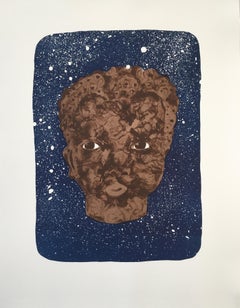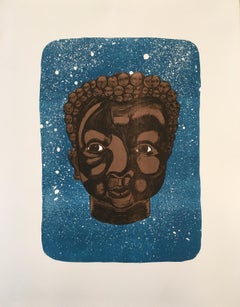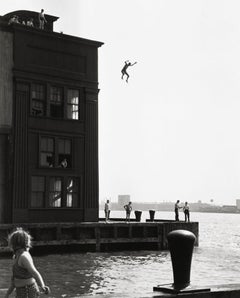Jennifer Mack Watkins
Black Boy Hope II
Located in Brooklyn, NY
On June 16th, 1944 an African American 14-year-old boy George Stinney was wrongly accused of murder and became the youngest child executed in the United States in the 20th century. ...
Category
2010s Contemporary Figurative Prints
Materials
Lithograph
Black Boy Hope I
Located in Brooklyn, NY
On June 16th, 1944 an African American 14-year-old boy George Stinney was wrongly accused of murder and became the youngest child executed in the United States in the 20th century. T...
Category
2010s Contemporary Prints and Multiples
Materials
Lithograph
People Also Browsed
Boy jumping into Hudson River, NYC by Ruth Orkin, 1948, Silver Gelatin Print
By Ruth Orkin
Located in Dallas, TX
Boys jumping into Hudson River, NYC by Ruth Orkin depicts a thrilling scene. A boy is suspended in the air after jumping off a tall building in New York City. Children are are seen s...
Category
20th Century Modern Black and White Photography
Materials
Silver Gelatin
H 14 in W 11 in D 0.1 in
Saint-Tropez Beach, Estate Edition, French Riviera
By Slim Aarons
Located in Los Angeles, CA
Slim Aarons' Saint-Tropez Beach, an Estate Edition photograph, is a vintage scene of sunbathers on the French Riviera, August 1971. Colorful coral red and mint green umbrellas shelte...
Category
1970s Realist Landscape Photography
Materials
Lambda
Free Shipping
H 20 in W 30 in
Monica Vitti - Vintage Photo - 1960s
Located in Roma, IT
Monica Vitti (Associated Press Photo) is a vintage b/w photo of the Italian actress on a boat at sea realized in the 1960s.
Monica Vitti is born in Rome on November 3, 1931. Admitte...
Category
1960s Contemporary Black and White Photography
Materials
Photographic Paper
Saint-Tropez Beach Estate Edition Photograph, French Riviera
By Slim Aarons
Located in Los Angeles, CA
Slim Aarons' Saint-Tropez Beach, an Estate Edition photograph, is a vintage scene of sunbathers on the French Riviera, August 1971. Colorful coral red and mint green umbrellas shelte...
Category
1970s Realist Landscape Photography
Materials
Lambda
Free Shipping
H 48 in W 72 in
Hilltop, limited edition, archival pigment ink photograph, signed and numbered
By Julie Blackmon
Located in Sante Fe, NM
Hilltop, limited edition, archival pigment ink photograph, signed and numbered
When looking at Julie Blackmon’s “Hilltop,” notice the elements that are in motion: the grass on the h...
Category
2010s Color Photography
Materials
Archival Pigment
"We Summon You Home, We Owe Them Nothing" - portraiture - Kehinde Wiley
Located in Atlanta, GA
This listing is for an unframed print.
Tokie Rome-Taylor is inspired by the works of Harmonia Rosales, Kehinde Wiley, Tawny Chatmon, Ayana V. Jackson, Omar Victor Diop, Deborah Robe...
Category
2010s Contemporary Portrait Photography
Materials
Pigment
Children Playing - American Vintage Photograph - Mid 20th Century
Located in Roma, IT
Children Playing- American Vintage Photograph is an original black and white photograph realized in the U.S in the mid-20th Century in a series of American life in the 20th Century.
...
Category
Mid-20th Century Modern Figurative Photography
Materials
Photographic Paper
No Reserve
H 7.88 in W 9.85 in D 0.04 in
Vintage Silver Gelatin Photograph Surrealist Doll Art Photo, Jazz Photographer
Located in Surfside, FL
These were from a show of her work. Influenced by Surrealism and Dada Photographs
these are images of old children's dolls in various states of decay. These bear the influence of Ha...
Category
20th Century Surrealist Black and White Photography
Materials
Silver Gelatin
"Preparation of a Seer" - contemporary portrait - Kehinde Wiley
Located in Atlanta, GA
This listing is for an unframed print.
Tokie Rome-Taylor is inspired by the works of Harmonia Rosales, Kehinde Wiley, Tawny Chatmon, Ayana V. Jackson, Omar Victor Diop, Deborah Robe...
Category
2010s Contemporary Portrait Photography
Materials
Pigment
Slim Aarons Sea Drive 1967 Limited Estate Edition Supersize Print
By Slim Aarons
Located in London, GB
'Sea Drive' 1967 Slim Aarons Limited Estate Edition
1967. Film producer Kevin McClory takes his wife Bobo Sigrist and their family for a drive in an ‘Amphicar’ across the harbour at ...
Category
1960s Modern Figurative Photography
Materials
C Print
Free Shipping
H 48 in W 72 in
New York City (broken mirror)
By Helen Levitt
Located in New York, NY
14 x 10 inch gelatin silver print, initialed "H.L." on verso.
From the James Agee Family Collection.
Helen Levitt was a true master of the street, one whose poetic vision, humor, an...
Category
1940s Modern Black and White Photography
Materials
Silver Gelatin
'Curacao Children' 1979 Slim Aarons Limited Estate Edition
By Slim Aarons
Located in London, GB
'Curacao Children' 1979 Slim Aarons Limited Estate Edition Print
Three local children sitting on a low wall, Curacao, Netherlands Antilles, January 1979. (Photo by Slim Aarons/Gett...
Category
1970s Modern Color Photography
Materials
C Print, Color
Free Shipping
H 20 in W 24 in
Toy Rocking Horse, Naive Fun Pink Orange Photograph, Kids Room, Children's room
By Mitchell Funk
Located in Miami, FL
Mitchell Funk photographs a child's Rocking Horse Ride in the snow. The inherent beauty of this moving sculpture for kids is enhanced as flakes of white snow cling to the enamel pai...
Category
2010s Post-Impressionist Portrait Photography
Materials
Archival Ink, Archival Paper, Archival Pigment
Street Champion, 4th Ward, Houston, Texas by Earlie Hudnall, Jr., 1986
By Earlie Hudnall Jr.
Located in Dallas, TX
Street Champion, 4th Ward, Houston, TX by Earlie Hudnall Jr. features a group of children posing in front of a house. One of the boys flexes his arms while wearing boxing gloves, pos...
Category
1980s Contemporary Portrait Photography
Materials
Silver Gelatin
Slim Aarons, French Stately Home
By Slim Aarons
Located in New York, NY
French Stately Home
1956
C print
40 x 40 inches
Estate stamped and hand numbered edition of 150 with certificate of authenticity from the estate.
The Comte de Paris, pretender to...
Category
1960s Modern Color Photography
Materials
Lambda
'The Ali Children' 1980 Slim Aarons Limited Estate Edition
By Slim Aarons
Located in London, GB
'The Ali Children' 1980 Slim Aarons Limited Estate Edition Print
In Spanish style riding clothes from left to right: TRH Princess Rajwa Ali, Princess Basma Ali and Prince Abbas Ali...
Category
1980s Modern Color Photography
Materials
C Print, Color
Get Updated with New Arrivals
Save "Jennifer Mack Watkins", and we’ll notify you when there are new listings in this category.
More Ways To Browse
Jennifer Mack
Chanel Vintage Poster
Leroy Neiman Ski
Chagall Etching Watercolor
Bowl Watch
Leroy Neiman Baseball
Karl Lagerfeld Lithograph
Skiing Leroy Neiman
Chanel No 5 Print
Foujita Woodcut
Original Ww1 Poster
Christ Woodcut
Takashi Korin
Alexandre Jacob
Rent Vintage Clothing
Takashi Murakami Korin
Murakami Korin
Bayros Franz Von



